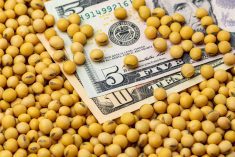Beijing | Reuters — China’s other suppliers of agricultural commodities will not be impacted by the Sino-U.S. trade deal since buying will be based on market principles, Vice-Premier Liu He said, according to a report from state-owned CCTV on Thursday.
Liu was speaking on Wednesday at a press briefing after signing the Phase One trade deal with U.S. President Donald Trump. The agreement includes a pledge by China to buy an additional at least $12.5 billion worth of agricultural goods in 2020, and at least $19.5 billion more than the 2017 level of $24 billion in 2021 (all figures US$).
Read Also

U.S. grains: Soybeans rise on export optimism; corn, wheat nearly flat
Chicago | Reuters – Chicago soybean futures rose about one per cent on Tuesday on optimism about demand for U.S….
Chinese companies will import U.S. agricultural goods according to consumers’ need, and demand and supply in the market, Liu told the reporters, according to state-owned CCTV.
“The China market is a very important part of the international market now. It is not that like any country can export as many products (to China) as they want. Rather you need show the competitiveness of the product,” he said.
Liu’s comments underscore the uncertainty that remains about the deal and how China will implement the uptick in U.S. imports after an 18-month trade dispute that caused Chinese agricultural buyers to shift their supply chains.
To reach the purchase target, China will need to increase its buying by intervening in the agricultural products market without upsetting its current trade partners, said a China-based grains trader with an international trading firm who is not allowed to speak to the media.
“The government will intervene to some extent, like asking state firms to buy or providing some quotas,” but China is basically letting all nations compete and offer better priced products, the trader said.
Under the deal, Beijing did not reduce or remove additional tariffs on U.S. farm products introduced in retaliation to U.S. tariffs.
Competition between U.S. and Brazilian soybean supplies will be a focus as there are concerns China could cancel some Brazilian imports to bolster its U.S. purchases.
China buys about 80 per cent of Brazil’s soybean exports.
U.S. soybean imports are expected to be 35 million tonnes in 2020 as it has already bought soybeans from Brazil for the year, Li Qiang, chief analyst with Shanghai-based consultancy JC Intelligence said.
China uses soybeans to crush into cooking oil and soymeal for animal feed. Demand has declined as the African swine fever disease has decimated its pig herd.
“[China will] probably get some tariff exemptions for pork and soybeans going forward,” INTL FCStone senior Asia commodity analyst Darin Friedrichs said in a note to clients. However, he believes the Phase One agriculture purchases are difficult to achieve.
Other analyst believe China can implement the pledge. “If some U.S. products do not have advantage in price or do not have enough output, there are many other U.S. agriculture products available that China can increase imports of, like meats, and ethanol,” Li from JCI said.
— Reporting for Reuters by Hallie Gu and Shivani Singh.
















